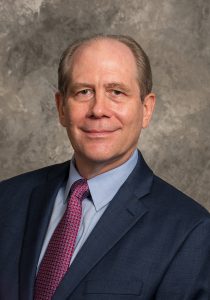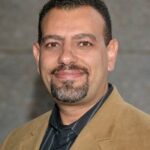In November, David R. Karp, MD, PhD, became the ACR’s 84th president.
Dr. Karp is the chief of the Rheumatic Diseases Division at UT Southwestern Medical Center, Dallas, a role he has held for the past 18 years.
For the past 15 years, Dr. Karp’s research has focused on systemic lupus erythematosus, including the of use of genomics and proteomics to help understand disease progression. He joined the ACR during his fellowship and has been involved as a volunteer for the past 17 years, serving in various committee roles, leading the Rheumatology Research Foundation and serving on the ACR Board of Directors’ Executive Committee.
The Rheumatologist spoke with Dr. Karp about what led him to his latest leadership role and his goals for the ACR in 2021.
TR: Can you highlight several achievements from your previous roles with the College?

Dr. David Karp
Dr. Karp: I started out as a reviewer and, later, study section chair for career development and research grants funded by the ACR Research and Education Foundation, now the Rheumatology Research Foundation. I then became the chair of the Scientific Advisory Council of the Foundation for four years. In that role, I was part of a team that redesigned the Foundation grant portfolio to better serve junior physician-scientists, clinician-educators and health professionals. We also created a very successful targeted research program initially focused on rheumatoid arthritis and now expanded to support innovative research studies in all rheumatic diseases. This has been a successful effort for the Foundation that has led to many new discoveries, over $100 million in new NIH funding and hundreds of prominent publications and presentations.
I then served as vice president and then president of the Rheumatology Research Foundation. During that time, we were able to expand our support for training, career development and innovative research. Importantly, we added community members to the Foundation board, providing a much-needed patient voice in the development of programs and goals.
In 2015, I joined the ACR Board of Directors as a member at large, and in 2018 I was appointed to the Committee on Finance. While there, an unexpected vacancy occurred in the leadership. The Committee on Nominations and the Board of Directors asked me to step in given my prior experience. It was a tremendous honor to have the confidence of my colleagues and a privilege to serve the College. I served as ACR treasurer and entered my year as president-elect in November 2019, expecting a rather calm year assisting Ellen Gravallese, MD, with a number of important projects started earlier that year. Little did we know that our plans would be upended by COVID-19.
TR: What are the ACR’s top priorities for 2021, including ongoing initiatives and new challenges?
Dr. Karp: It is hard to say anything about 2020 but COVID-19. It has dominated our lives at home, at work and in the ACR, and it looks like it will stay around for a while in one way or another. Fortunately, the ACR has taken a tremendous response to the pandemic in many ways. Task forces provided our members and their patients with information on many topics, including the care of adults and children with rheumatic diseases who have been exposed to or infected with SARS-CoV-2, as well as issues relating to the safe and effective operation of our practices during the pandemic. The ACR will continue monitoring several ongoing areas related to the pandemic, including: the development of vaccines and their safety and effectiveness in our patients; the possibility of monoclonal antibody treatment and other antivirals; and the impact of federal and state policies on how we care for our patients.
One benefit of COVID-19 is that we have accelerated our three-year educational strategic plan designed to engage learners in ways that best suit them. Our all-virtual ACR Convergence 2020 was a smashing success, thanks to the hard work of the staff and volunteers who put it together. Looking forward, we know that some of our education will continue to be virtual, especially in the beginning of 2021. We don’t have any idea about ACR Convergence 2021, but I hope we will be able to go to San Francisco and once again see and talk to each other in person.
We also made a pledge this summer to take to heart the social divisions in this country and look reflectively at ourselves as a profession and an organization and work hard to correct racial inequality. A Diversity and Inclusion Task Force has been created and will provide recommendations in 2021 for the Board of Directors to act on. These are important steps we all need to take to improve our workplaces, our profession and the care we provide to patients with rheumatic diseases.
TR: What unique characteristics, experiences or ideas do you bring to this role?
Dr. Karp: I have been working in research since my undergraduate days at MIT, where I was introduced to the career of a physician-scientist. At the time, I was trying to figure out if I was going to become a doctor or scientist. Suddenly, I could be both. I had great mentors who got me hooked on rheumatology by allowing me to participate in rheumatology rounds and conferences. Early on in my career it was clear to me that there was a great opportunity to discover the immunological pathways responsible for rheumatic diseases and at the same time establish long-term relationships with patients while making a significant improvement in their lives.
After three-and-a-half years at the NIH, I joined the faculty of the UT Southwestern Medical Center in 1991. I began studying basic molecular and cellular immunology focused on antigen presentation. When Ward Wakeland, PhD, and Nancy Olsen, MD, joined our faculty, we created an interdisciplinary team focusing on systemic lupus erythematosus, and this has been my research focus for the past 15 years. We also have a large training program with four fellows each year. I am fortunate that through my ACR connections and activities I have learned how to run this combination of group practice, graduate medical education and investigation.
TR: What longstanding challenges does the College face, and how can we overcome them?
Dr. Karp: The ACR is a nonprofit business, but a business, nonetheless. COVID-19 has affected one of the most significant revenue generating parts of the College—our in-person educational meetings. Lower expenses in many areas mean that our financial picture is fine right now, but we need to be very careful going forward until a new reality is apparent post-pandemic. Prudent financial management and careful investments have put us on a sound financial footing, and I am very confident we will come out of the pandemic in good shape.
One ongoing challenge is meeting the professional needs and expectations of all our members. It is easy to name the silos—community practice, academic divisions, research, education, Boomers, Gens X, Y and Z, as well as all the different specialties in the ARP. All of these groups are welcome and needed in the ACR. That’s why our Governance Task Force, chaired by Abby Abelson, MD, MACR, and Angus Worthing, MD, FACR, FACP, is evaluating how the ACR’s volunteer committees, policies and procedures, and administration fit with our strategic goals. One hope is that we can change our volunteer structure a bit to retain the great enthusiasm and energy that has sustained us for many decades, but also increase participation by more members, including younger volunteers and members from the practice community.
TR: How do you hope to prepare the ACR to achieve its next milestones five years from now?
Dr. Karp: I don’t know any organization right now that is predicting where they will be in five years, but I’m optimistic. I am confident that the work we started this year to modernize our operations, make our educational offerings more accessible and relevant to learners in the U.S. and around the globe, and eliminate bias in our work and patient care will have paid off. I do hope that in five years we have achieved solid milestones with regard to our workforce shortage. I am proud to be leading this phase as we move from needs to ideas to implementation. Like all ACR presidents before me, I am amazed by the talent and enthusiasm of my colleagues who have volunteered for the College and by our incredible staff in Atlanta. It will be a privilege to work with them to solve these problems.
TR: What is something that the membershis might not know about you and your life outside of work?
Dr. Karp: I married my high school sweetheart, Corinne. Our son, Alex, lives in Seattle and manages databases for a commercial real estate firm. Corinne is a gourmet cook, and sometimes she lets me help. Mainly I get the fruits of her labors. As foodies, we love to travel and try local cuisines. We hope to get back to that soon. We love to hike, particularly challenging trails in our national parks.
I am also an inveterate cruciverbalist. I solve one or two [crossword puzzles] per day. I should take up making them, but [I have] too many other duties.


